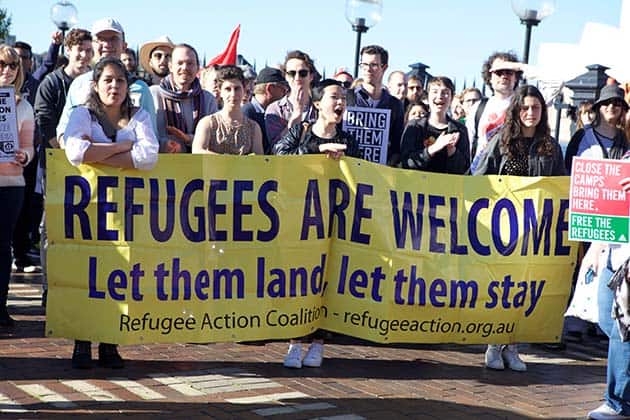For a while, it looked like refugees were not going to feature much in the election campaign, with the government focused on scaremongering about war with China.
But it wasn’t long before Scott Morrison found a chance to boast about being the architect of Operation Sovereign Borders and turning back asylum boats.
The tragedy was that Anthony Albanese’s response was to confirm that Labor was also committed to offshore detention and boat turnbacks. Shamefully, Albanese even tried to take credit for re-opening Manus and Nauru under the last Labor government in 2012.
Boat turnbacks became Labor policy in 2015. At the time, Albanese, as part of the Labor left, opposed boat turnbacks.
But he flipped in 2018 in time for the 2019 federal election, telling Sky News that, “The [Morrison] government’s policies have stopped the boats.”
Morrison drove home Labor’s capitulation during the Sky News debate when he asked Albanese why he didn’t support turning boats around in 2013, when he re-opened Nauru and Manus.
Meanwhile, Labor has held the line over abolishing Temporary Protection Visas (and SHEVs), a change that will make a huge difference to the thousands of refugees who have been denied permanency, family reunion and the right to university study and travel for more than ten years.
But then a few days later, out of the blue, home affairs minister Karen Andrews told ABC radio that a re-elected Morrison government would ban any refugees from PNG or Nauru settled in New Zealand from coming to Australia, although she couldn’t say how.
Labor’s shadow immigration minister, Kristina Keneally, came to her rescue.
Even using the government’s language, Keneally announced that Labor would “close that back door by legislation or by regulation” if elected in May.
It was a graphic example of Labor’s small target policy in practice. Rather than championing refugee rights, Labor was trying to outflank Morrison from the right.
Unfinished business
The sordid episode focused attention on one of the main pieces of unfinished business for the refugee movement—the New Zealand deal.
The deal will resettle 450 refugees over three years. There are 111 refugees left on Nauru but all bar 27 are heading to the US or Canada. Yet refugees in PNG are not eligible for New Zealand.
There are 105 refugees (a little more if you count their family members) in PNG. All the people on Nauru and in PNG could be resettled this year if PNG refugees were included in the deal.
The New Zealand deal was always a way for Australia to avoid protecting the refugees it had exiled to Nauru and Manus. The demands to “Close offshore, bring them all here” are as relevant as ever.
This raises the second bit of unfinished business—permanent visas for all those from offshore in the community on bridging visas. There are still 1179 refugees—from the Kids Off Nauru and the Medevac legislation—living in the community in Australia. Some are in community detention; most have been forced to survive on temporary visas renewed every six months. There are not enough places for all of them in New Zealand—around 500 will be left behind.
And children have been born here; kids have started school. Why should they be forced to go to New Zealand to gain permanent protection?
With Labor now saying that refugees resettling in New Zealand will not be able to enter Australia, there is one more reason for the refugees from Manus and Nauru already in Australia not to be part of the deal. The movement will need to fight for their right to stay on permanent visas.
And then there is the need to lift the government ban on accepting refugees from Indonesia. There needs to be a pathway for the 14,000 refugees there (including 7000 Afghans) to get to Australia. This needs to be connected to an immediate intake of 20,000 Afghans—over and above the annual humanitarian intake.
A two-year protest campaign—inside and outside the prison hotels—finally saw almost all the Medevac refugees released in the dying days of the Morrison government. But the election campaign is a warning.
A Labor government elected on 21 May will scrap TPVs and get the Tamil family back to Biloela, but the shattered lives on and offshore and the Fortress Australia policy are as much Labor’s legacy as the Liberals’.
Thirty years ago, a Labor government introduced mandatory detention. A Labor government elected on 21 May will also be committed to offshore detention and to using the navy to turn back asylum boats.
More protests, with the backing of the union movement, will be needed to free all the refugees and finally win the humanitarian policy that the refugee movement has been fighting for.
By Ian Rintoul






